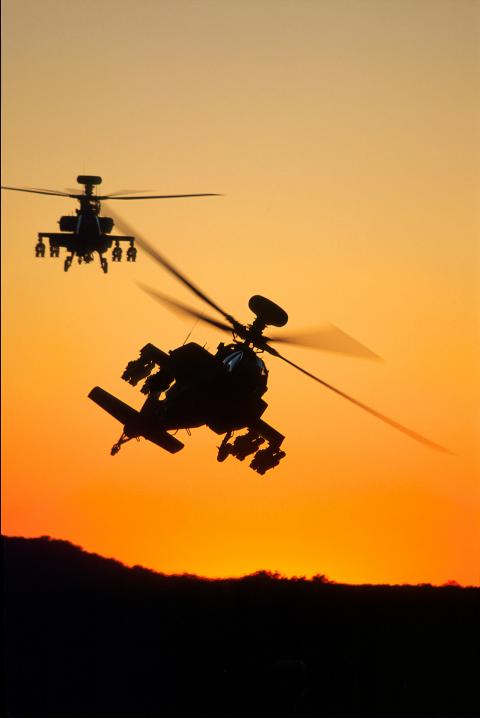The Taiwanese army earlier this year took delivery of the first of 30 Apache combat helicopters from the US and next month pilots and crew will begin training on the platform, which recently received a new designation from the US Army.
As a result of the significant upgrades made to the AH-64D Block III Apache during its development, the US Army recently decided to re-designate it the E model. To date, 25 AH-64Es have been delivered to the US Army and Taiwan received its first delivery during a low-key handover ceremony at Boeing Co’s Mesa facilities in Arizona in May.
According to Aviation Week, training for Taiwanese pilots and crews is expected to begin next month.

Photo courtesy of Boeing Co.
Following approval by the US government in August of contracts for full production of the helicopter, Boeing is now building four AH-64Es per month for the US Army, which plans to buy a total of 690, and three for foreign military sales (FMS). The US has also notified Congress for the sale of eight AH-64Es to Indonesia, 22 to Qatar and 22 to India, the latter under a non-FMS “hybrid” agreement.
If tests at the Naval Air Station China Lake in California last year are any indication, Taiwan’s AH-64E will be a far more formidable combat helicopter than its predecessors. During the drills, the E model reportedly countered realistic air defense threats and was able to maintain its position, unlike the Block II Apaches, which was “shot down” in similar exercises.
“The Block III absolutely frustrated these folks that operate these [air defense] systems,” Colonel John Lynch, attack helicopter manager at Army Training and Doctrine Command, told Aviation Week.
This was partly due to the aircraft’s ability to operate at lower altitudes and thus evade radar systems arrayed against it.
Part of the Echo model’s advantages are its improved composite main rotor blades, which are 15cm longer than those used on older models, as well as a new tip design and General Electric T700-GE-701D engines, all of which give the aircraft improved aerodynamic performance.
The AH-64Es’ new power-to-weight ratio also makes it safer for operations at low-levels and gives it a performance similar to that of the AH-64A, which was significantly lighter than the AH-64D Block II model, Lynch told Shephard Media, a defense and aerospace publication.
Taiwan’s 30 Apache helicopters, administered under a program named “Sky Eagle,” were included in an October 2008 notification to US Congress for about US$2.5 billion. Full delivery of the multirole attack helicopters is expected to be completed in 2017.

Chinese Nationalist Party (KMT) Chairman Eric Chu (朱立倫), spokeswoman Yang Chih-yu (楊智伃) and Legislator Hsieh Lung-chieh (謝龍介) would be summoned by police for questioning for leading an illegal assembly on Thursday evening last week, Minister of the Interior Liu Shyh-fang (劉世芳) said today. The three KMT officials led an assembly outside the Taipei City Prosecutors’ Office, a restricted area where public assembly is not allowed, protesting the questioning of several KMT staff and searches of KMT headquarters and offices in a recall petition forgery case. Chu, Yang and Hsieh are all suspected of contravening the Assembly and Parade Act (集會遊行法) by holding

PRAISE: Japanese visitor Takashi Kubota said the Taiwanese temple architecture images showcased in the AI Art Gallery were the most impressive displays he saw Taiwan does not have an official pavilion at the World Expo in Osaka, Japan, because of its diplomatic predicament, but the government-backed Tech World pavilion is drawing interest with its unique recreations of works by Taiwanese artists. The pavilion features an artificial intelligence (AI)-based art gallery showcasing works of famous Taiwanese artists from the Japanese colonial period using innovative technologies. Among its main simulated displays are Eastern gouache paintings by Chen Chin (陳進), Lin Yu-shan (林玉山) and Kuo Hsueh-hu (郭雪湖), who were the three young Taiwanese painters selected for the East Asian Painting exhibition in 1927. Gouache is a water-based

Taiwan would welcome the return of Honduras as a diplomatic ally if its next president decides to make such a move, Minister of Foreign Affairs Lin Chia-lung (林佳龍) said yesterday. “Of course, we would welcome Honduras if they want to restore diplomatic ties with Taiwan after their elections,” Lin said at a meeting of the legislature’s Foreign Affairs and National Defense Committee, when asked to comment on statements made by two of the three Honduran presidential candidates during the presidential campaign in the Central American country. Taiwan is paying close attention to the region as a whole in the wake of a

OFF-TARGET: More than 30,000 participants were expected to take part in the Games next month, but only 6,550 foreign and 19,400 Taiwanese athletes have registered Taipei city councilors yesterday blasted the organizers of next month’s World Masters Games over sudden timetable and venue changes, which they said have caused thousands of participants to back out of the international sporting event, among other organizational issues. They also cited visa delays and political interference by China as reasons many foreign athletes are requesting refunds for the event, to be held from May 17 to 30. Jointly organized by the Taipei and New Taipei City governments, the games have been rocked by numerous controversies since preparations began in 2020. Taipei City Councilor Lin Yen-feng (林延鳳) said yesterday that new measures by